There has been, ever since The Force Awakens came out, been an element of resistance to – or backlash against – the character Rey in particular, at least from some sections of the Internet.
And – even speaking as someone who didn’t even want more Star Wars films and who still thinks Return of the Jedi should remain the end-point of the Star Wars saga – I want to argue or reiterate here why Rey is potentially the perfect Star Wars hero.
And why she is, in particular, perfect for the current set of films.
She is in fact the main strength of The Force Awakens – a film that I think was lacking in various ways, but in which Rey/Daisy is the backbone that holds the whole thing up.
From the very get-go, Rey epitomises that ineffable Star Wars aura.
Everything about her evokes Tatooine, the Skywalkers and the heart of Lucas’s mythology. Some of this is established in the story points, some of it in her performance, but a lot of it is primarily established in simple, wordless visuals, just as it was with Luke and Anakin.
This is the case from her very first appearance in the film.
George Lucas had often said that the most powerful Star Wars moments were like silent movies – and this is borne out in what we see of Rey, especially early in the film.
The fact that Rey is a scavenger and lives in a place surrounded by junk, works in a junk store, wears rustic, desert garb – it’s all perfect. It’s all saying ‘this is Star Wars and I am a Star Wars hero’.
Like A New Hope and The Phantom Menace and Luke and Anakin and Tatooine, it’s all very old-world, very Biblical too.
We’re shown Rey’s life in a way that’s very visually, tonally and aesthetically demonstrative rather than explained; every little detail, from the way she bakes this small amount of bread for her measly dinner, the way she has to go about her daily life eking a meagre living, right down to the old X-Wing blast helmet, etc.
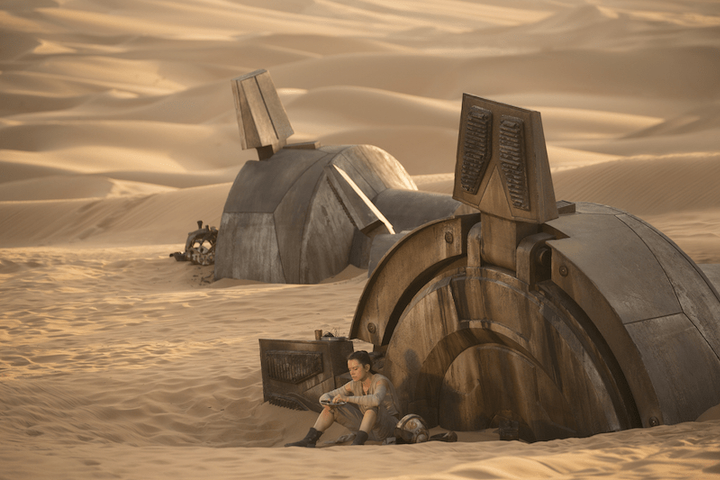
And the fact that she’s literally living inside an old, fallen Imperial AT-AT is just a touch of utter genius.
A long-fallen Star Destroyer, half buried in the sand, speaks to us of the galaxy that once was, and speaks to Rey of old worlds and conflicts and adventures (that shot of the hazy, buried Star Destroyer is a brilliant visual, by the way; a perfect way to demonstrate in a single image how long ago the events of the Original Trilogy were and far gone and almost mythical those events are now meant to seem).
It’s very ANH Luke, but even more pronounced than that. Unlike Luke, Rey is entirely a solitary figure, who has been utterly abandoned; she doesn’t even have an Aunt Beru or Uncle Owen or a Biggs Darklighter.
If the sense of Luke on Tatooine is one of the most iconic things in Star Wars, The Force Awakens effectively recaptures that aura and makes it new again through Rey and her life. Rey also has a great gift for mechanics and for fixing things, just like Anakin did.
When I was sitting in the cinema, watching these scenes, it felt like a homecoming; the tone and the imagery was so resonant and familiar, yet new and different at the same time.
It’s like hearing an old, familiar tune but with a new instrument in the mix – which, as it happens, is also something I’ve heard Lucas say about how the ‘tone poetry’ of Star Wars works and which is therefore why I say that Rey (as presented in TFA) is the perfect Star Wars hero and perfectly in-tune with the spirit and style of the Star Wars mythology.
I am not, for the record, arguing that Rey is the greatest hero in the Star Wars mythology – not at all.
Just that she’s the best, most perfect, hero and central character we could have right now, at this juncture, in the life of Star Wars. She’s not the bad-ass that Ewan Magreggor‘s Kenobi was, or the cool gun-slinger that Han Solo was, or the starry-eyed, questing hero that Luke was.
She’s something different, new, interesting, refreshing. As Lucas might say, a new instrument in an old symphony.
And she got a near-perfect intro in The Force Awakens.
Her lightsaber duel with Kylo Ren – particularly the very dramatically-amplified Force-connection moment – was already (in just the first film) one of the great hero moments of Star Wars.
Emotionally, dramatically, thematically, it’s a powerful, sublime moment.
For all the whiney Internet chatter about Disney pushing a ‘feminist’ agenda with a female protagonist, had *I* been writing this third trilogy I would’ve wanted a female protagonist without doubt, as we’ve already had two trilogies with male protagonists. At no point do I feel like Rey is a token creation or a political or social statement. Rey is simply a hero’s journey in the making, regardless of gender considerations.
Some people I’ve noticed are pointing out what they perceive to be overtly ‘feminist’ elements, such as Rey objecting to Finn holding her hand, etc. But if there are vaguely ‘feminist’ subtexts to these things, it doesn’t feel overtly intended, but more organically flowing out of the story and the natural characterisation.
I like the idea that Rey, having been solitary most of her life, doesn’t really have a sense of gender politics or gender roles. She is baffled at Finn taking her hand, resents Finn trying to rescue her during their first encounter on Jakku, etc. But it makes sense; Rey is totally self-sufficient because she has had to be her whole life.
In some sense, she is almost androgynous. And when she does eventually develop a bond with Finn, it’s clear that what she is reacting to is the simple reality of friendship; of having someone who looks out for her.
If I had been writing a female central protagonist for a film like this, I too would’ve been inclined to make her strong and self-sufficient and not for the sake of any political or social statement, but simply out of respect for the character.
The things I would absolutely *not* do would be to have her need to be rescued by her male friends or, more importantly, to have her fall in love with one of the male characters.
Which is why I found myself satisfied with how Rey is portrayed and developed across the movie.
The fact that when Finn, Han and co do come to rescue her late in the movie, she has already freed herself and basically doesn’t need to be rescued is a great touch, all the more so because she is nevertheless utterly delighted to see them and is genuinely grateful for their presence.
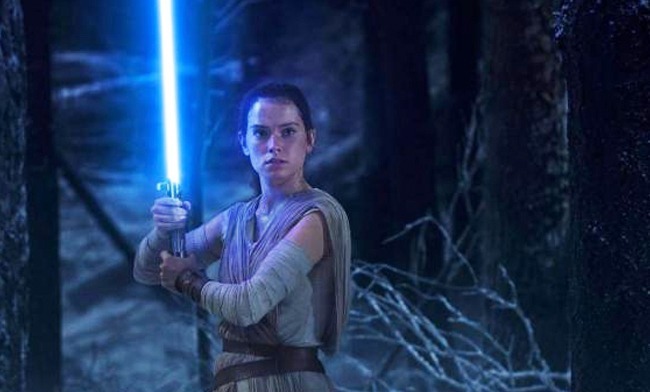
This then becomes a story about friendship and the development of a platonic love.
The best dynamics in Star Wars have always been about platonic love, and actually the sci-fi, fantasy, comic-book genres are generally populated by great stories about platonic love. The best example is Kirk, Spock and McCoy in Star Trek.
And really, all the people objecting to Rey as a ‘feminist’ character need to get a life.
Also, even if Rey was some kind of feminist statement; why would that even be objectionable?
In terms of Rey being a ‘Mary Sue’, I’m aware that a lot of people complain about Rey’s seemingly being perfect at everything and, in particular, her very sudden/quick development of Force abilities in this film.
I have two thoughts about this.
The first is something I’m calling Star Wars Reincarnation Theory – which is complicated, so I won’t explain it here (but will elaborate on it in a future post).
The second is simply what George Lucas had already put into place for us in 1999. It’s called ‘midi chlorians’.
And I really would have a lot more respect for Kathleen Kennedy, Disney and the other new controllers of the Star Wars mythology if in the next film they do mention the midi-chlorians. Because it would explain Rey and her powers perfectly; and it’s all there, all in place from Lucas and the prequels.
Aside from all of that, Daisy Ridley is arguably the best thing about The Force Awakens. And the new mythology being established around Rey is – at least for now – a perfect way to have launched us into the next generation of Star Wars.
How Rey develops in The Last Jedi and the beyond is another matter – as I can’t speak for any of that yet. It may even turn out that The Force Awakens is her best film.
For the moment, all the Lucasfilm/Disney people need to do is say the words “midi chlorians” to explain Rey’s ‘Mary Sue’ issues and overly fast development in TFA – and then she really will have been a perfect Star Wars hero.


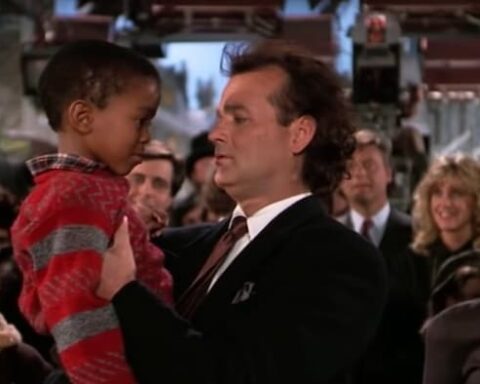
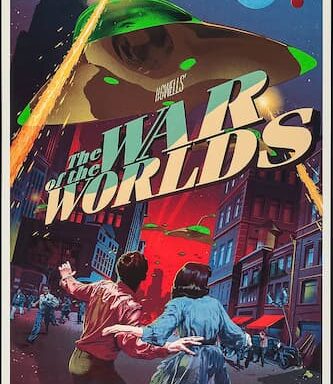
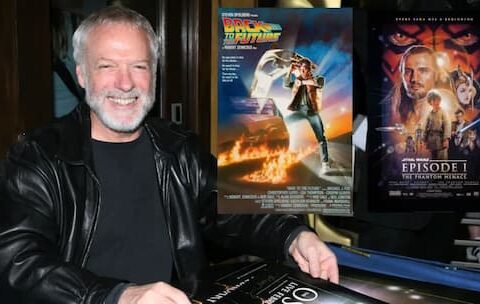
How Disney treats Rey will make or break the current franchise? I’m sick of some of the backlash that surrounds her by original trilogy fans. She is Star Wars’ future (at least in this new trilogy).
I think the backlash is unfortunately just a sign of the times we now live in.